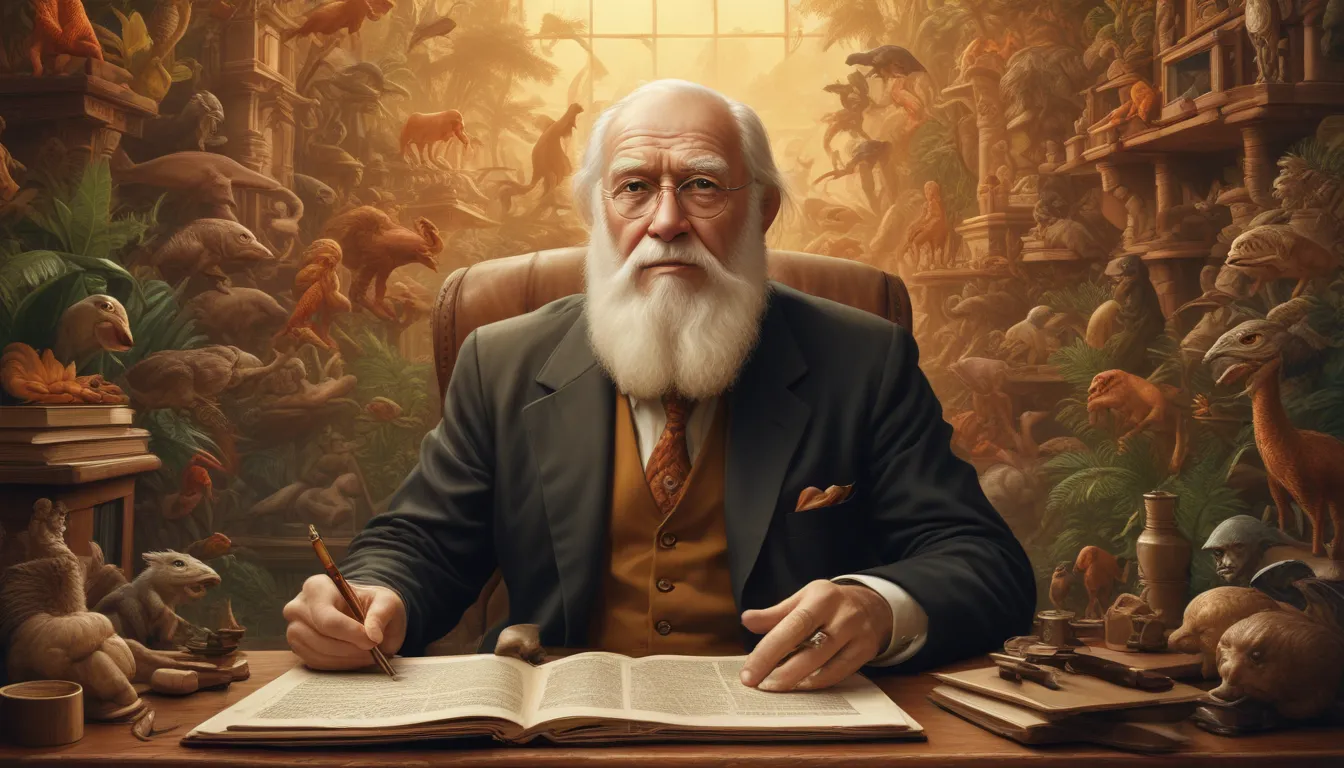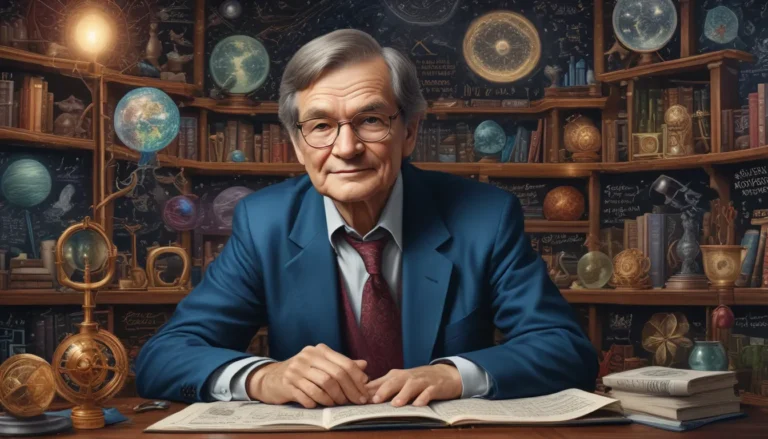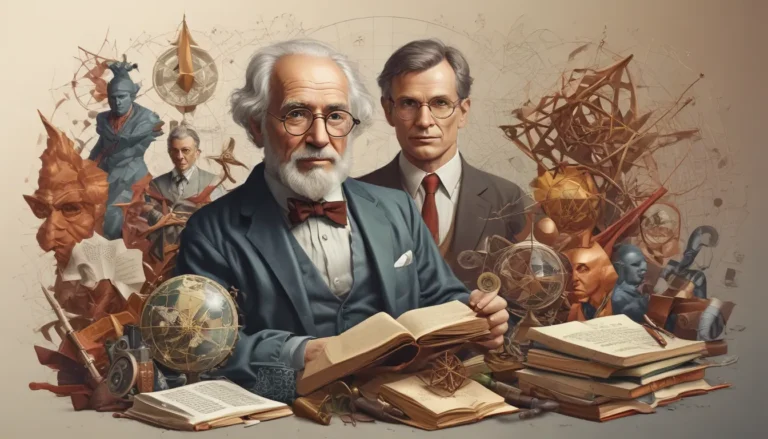The images in our articles may not match the content exactly. They are used to grab your attention, not to show the exact details in the text. The images complement the text but do not replace it.
Are you curious about the life and legacy of the renowned naturalist Charles Darwin? Dive into this educational journey to discover intriguing facts about this influential figure and his groundbreaking contributions to science. From his early education to his revolutionary theory of natural selection, there is a wealth of knowledge to uncover about Charles Darwin. Let’s explore his remarkable life in depth.
Unveiling Charles Darwin’s Educational Journey
Charles Darwin’s educational path was filled with twists and turns that shaped his future as a naturalist. Born on February 12, 1809, in Shrewsbury, England, Darwin initially embarked on a medical career at the University of Edinburgh. However, his passion for natural history soon took precedence over his medical studies. Joining the Plinian Society at the university, Darwin delved deep into the world of naturalism and made significant discoveries that paved the way for his future endeavors.
Despite his father’s initial aspirations for him to become a doctor, Darwin’s academic journey led him to Christ’s College, Cambridge, where he continued to pursue his passion for natural sciences. As he collected beetles and explored the connection between God and nature, Darwin’s intellectual curiosity blossomed, setting the stage for his extraordinary career as a naturalist.
The Epic Voyage of the HMS Beagle
One of the most defining moments in Charles Darwin’s life was his transformative voyage aboard the HMS Beagle. Commissioned by Captain Robert FitzRoy, the expedition was initially intended to last two years but extended to a remarkable five-year journey. Darwin’s experiences during this voyage laid the foundation for his groundbreaking theories and discoveries.
Sending back specimens and letters from South America and the Galapagos Islands, Darwin gained recognition in academic circles even before returning to England. His encounter with a diverse range of species inspired him to delve deeper into the mysteries of the natural world, shaping his evolutionary insights for years to come.
Unraveling the Mysteries of Natural Selection
Upon his return to England, Charles Darwin was met with a new challenge—deciphering the significance of the specimens he had collected during his voyage. Little did he know that his observations of 12 distinct species of finches would revolutionize the field of evolutionary biology.
Upon presenting his findings to the Zoological Society, Darwin was astounded to learn that the birds he had classified as different species were, in fact, 12 distinct varieties of finches. This revelation, coupled with the guidance of ornithologist John Gould, propelled Darwin towards the concept of natural selection, a cornerstone of his evolutionary theory.
Embracing the Role of a “Gentleman Scientist”
Despite initial skepticism from his father, Charles Darwin’s dedication to his scientific pursuits earned him the title of a “gentleman scientist.” Liberated from institutional constraints, Darwin embarked on a journey of independent research, focusing on geology and naturalism with unwavering dedication.
His ability to secure funding and grants for his work enabled him to publish groundbreaking scientific papers and books, including the seminal work “On the Origin of Species.” Darwin’s commitment to advancing scientific knowledge as a self-funded researcher reflects his enduring legacy as a pioneer of evolutionary theory.
Unveiling the Enigma of Darwin’s Health
Throughout his life, Charles Darwin grappled with recurrent health issues that remained undiagnosed. From his struggles at the University of Edinburgh to his ailment-ridden voyages aboard the HMS Beagle, Darwin’s health woes were a constant companion on his scientific journey.
Despite seeking medical advice and consulting various professionals, Darwin’s ailments, including nausea, headaches, and heart palpitations, remained shrouded in mystery. While modern theories suggest the possibility of dysautonomia, the exact nature of Darwin’s health conditions continues to intrigue researchers and historians today.
Commemorating Darwin’s Legacy and Beliefs
On April 19, 1882, Charles Darwin breathed his last, succumbing to heart disease at his home in Downe, Kent, England. His profound impact on the field of natural science and evolutionary theory endures to this day, immortalizing him as a pioneer of scientific inquiry and exploration.
Despite rumors of a religious conversion before his death, Darwin’s steadfast adherence to agnosticism is confirmed by his son, Francis Darwin. His unwavering commitment to empirical evidence and rational inquiry defined his philosophical outlook, underscoring the importance of critical thinking and scholarly pursuit in understanding the natural world.
Celebrating Darwin’s Legacy on Darwin Day
Every February 12, admirers of Charles Darwin around the world celebrate his birth on Darwin Day. This commemorative event serves as a tribute to Darwin’s unparalleled contributions to scientific knowledge and inspires curiosity about the wonders of the natural world.
By fostering a spirit of inquiry and exploration, Darwin Day encourages individuals to embrace scientific reasoning and engage with the mysteries of nature in a spirit of intellectual curiosity and discovery.
Reflecting on Darwin’s Enduring Theory of Natural Selection
Charles Darwin’s theory of natural selection, expounded in his seminal work “On the Origin of Species,” revolutionized our understanding of evolutionary processes. Published in 1859, this groundbreaking treatise detailed the mechanism by which species evolve through the preservation of favorable traits in the struggle for survival.
While Darwin’s theory was met with initial skepticism, its enduring influence on modern biology and scientific discourse is undeniable. By proposing a mechanism for evolution grounded in empirical observation and rigorous analysis, Darwin laid the groundwork for a new era of scientific inquiry and discovery.
Exploring Darwin’s Multifaceted Interests and Contributions
In addition to his evolutionary insights, Charles Darwin’s diverse interests and expertise extended to various scientific disciplines. From geology to biology, Darwin’s intellectual curiosity led him to explore a wide range of topics, shaping his multifaceted body of work.
Apart from his groundbreaking theory of natural selection, Darwin’s scientific endeavors encompassed a host of publications, including “The Formation of Vegetable Mould Through the Action of Worms.” This comprehensive exploration of earthworm activity underscored Darwin’s keen observational skills and his ability to uncover the hidden mysteries of nature.
Delving into Darwin’s Personal Life and Family Connections
Charles Darwin’s personal life was marked by profound relationships and familial ties that shaped his worldview and legacy. His marriage to his first cousin, Emma Wedgwood, symbolized a union of intellectual affinity and personal devotion, culminating in a marriage that endured through life’s trials and tribulations.
Together, Charles and Emma Darwin raised a family of ten children, navigating the joys and sorrows of parenthood with resilience and grace. Despite facing challenges such as the loss of children in infancy, the Darwins remained steadfast in their commitment to each other and their family, embodying the values of love and kinship.
Reflecting on Darwin’s Influence on Modern Discourse
As we contemplate the enduring legacy of Charles Darwin, it is essential to recognize his impact on contemporary intellectual discourse and scientific inquiry. From the Darwin Awards, which satirize foolish behavior, to his contributions to artificial ecosystems like Ascension Island, Darwin’s influence extends far beyond the realms of evolutionary biology.
By embracing the spirit of curiosity, exploration, and critical thinking embodied by Charles Darwin, we can honor his remarkable legacy and continue to unravel the mysteries of the natural world. Through our commitment to intellectual inquiry and scientific discovery, we pay homage to the enduring legacy of one of history’s greatest naturalists and thinkers.
Embracing the Spirit of Darwinian Inquiry
As we embark on a journey of discovery and exploration inspired by the life and work of Charles Darwin, let us nurture a spirit of curiosity and inquiry that propels us towards greater understanding of the natural world. By embracing the principles of empirical observation, critical thinking, and intellectual curiosity, we honor Darwin’s enduring legacy and pave the way for future generations of scientists and scholars to follow in his footsteps.
Join us in celebrating the remarkable life and legacy of Charles Darwin, a visionary naturalist whose discoveries continue to shape our understanding of the world around us. Through our collective pursuit of knowledge and discovery, we carry forward Darwin’s legacy of scientific inquiry and exploration, inspiring new generations to delve into the wonders of the natural world with awe and reverence.






